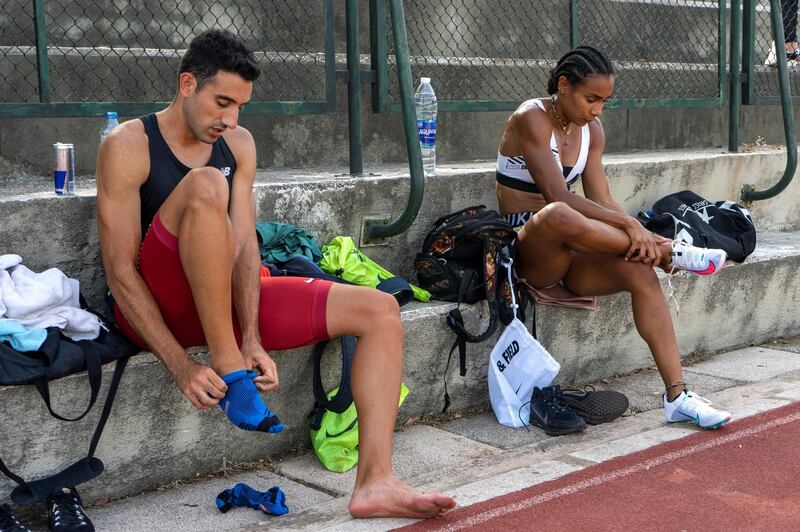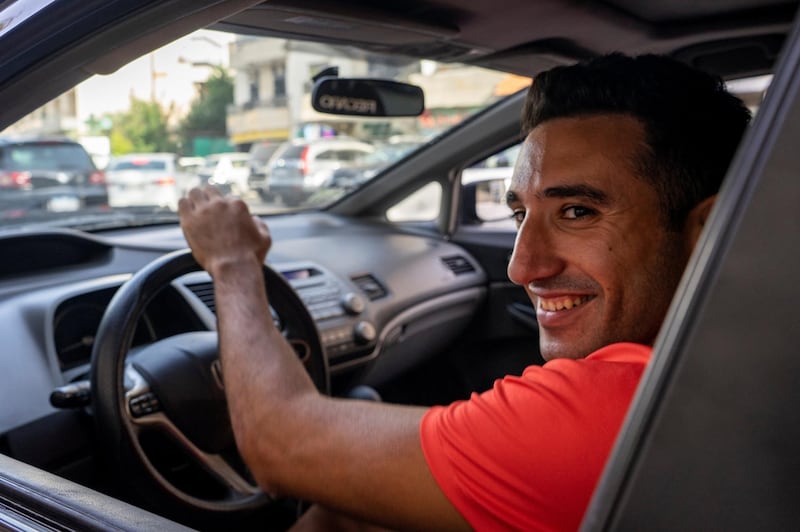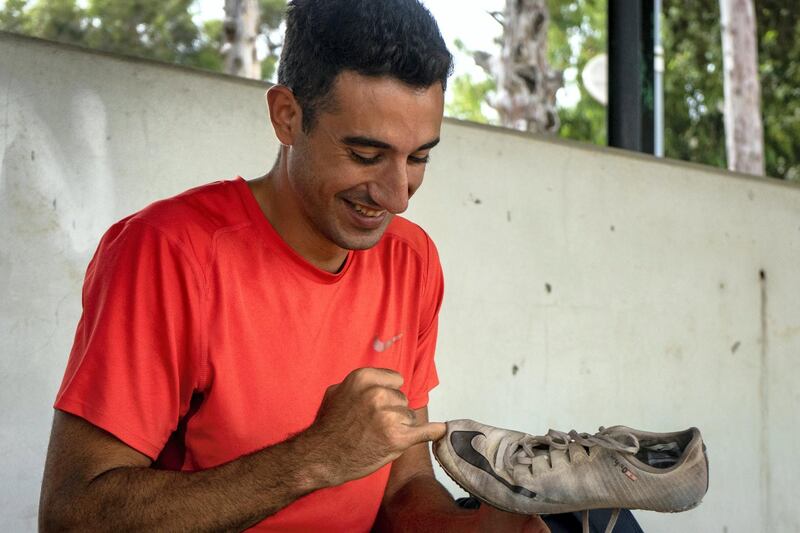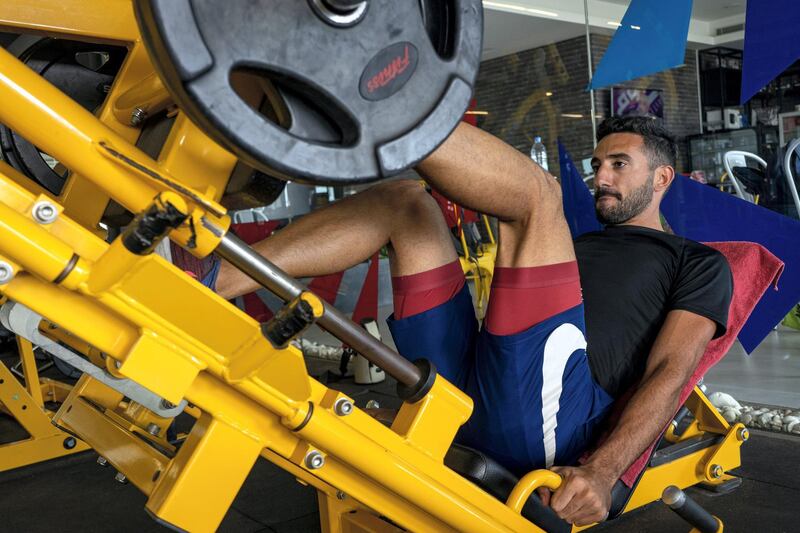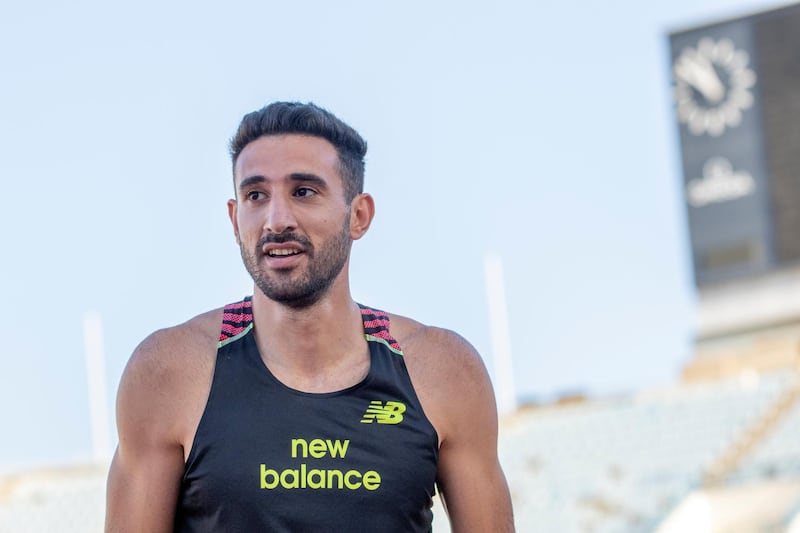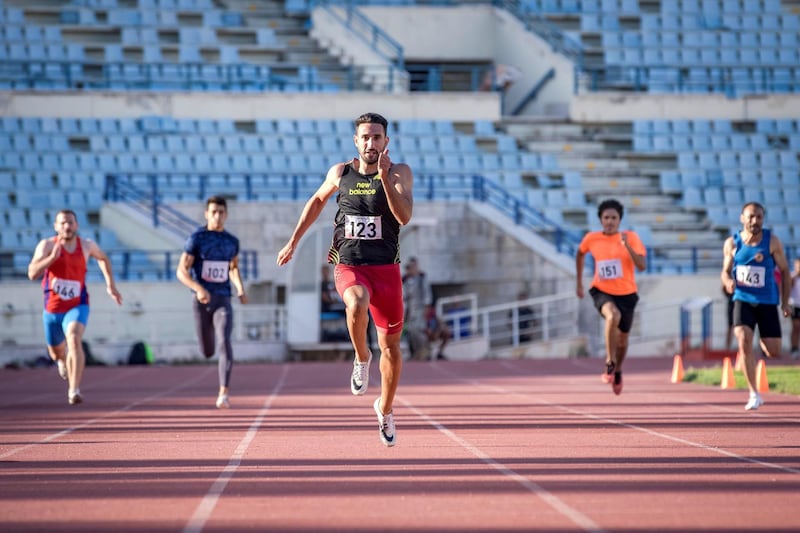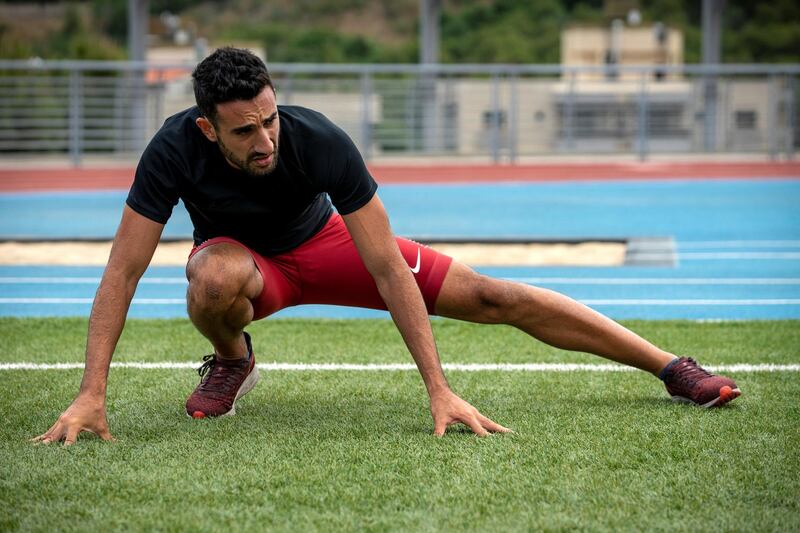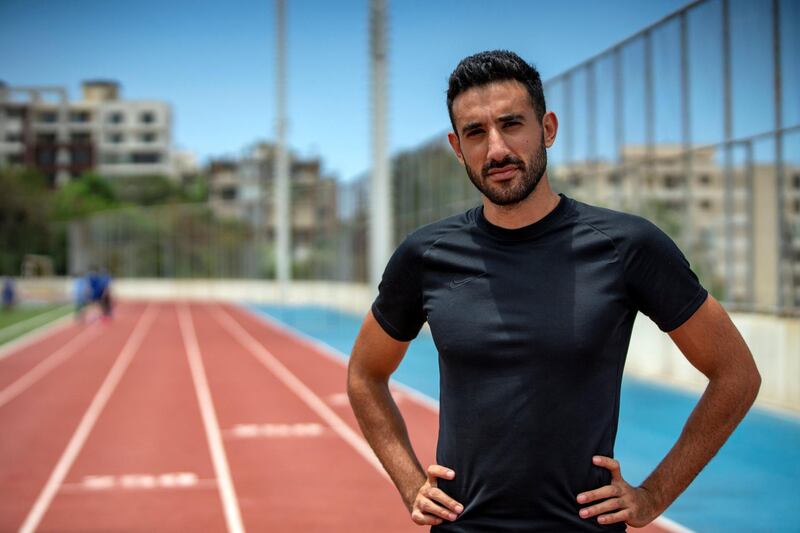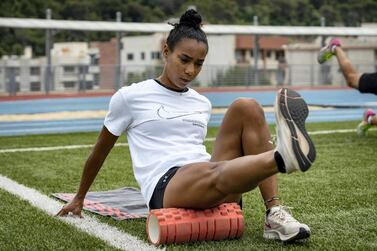As part of our build-up to the Tokyo Olympics we will be profiling Arab athletes and para-athletes as well as those from the Mena region hoping to make it to this summer's Games
Noureddine Hadid’s souped up Honda Civic hums as it winds around the hills of Baabda, just south of Beirut towards the Collège Notre Dame de Jamhour.
Nour seems relaxed; he sits back in his modified racing seats and pulls over, parking just outside the entrance of the college race track. He is the first to arrive for the 100m and 200m races, scheduled in over an hour’s time.
"I'm feeling really good today, I am ready," Hadid tells The National as he waits for the gates to open.
Under the hood of the cool and calm exterior, Hadid is a mix of nerves and excitement; he knows he is going to win today, on a track that has been the setting of so many of his victories and achievements before. However, he also knows that the race will be his last attempt in Lebanon to drop his times enough to earn a berth on Lebanon’s Olympic team.
Hadid, along with Aziza Sbaity and Chirine Njeim, make up the three Lebanese athletes who are fighting for a single 'universality' place, reserved for Lebanon's 'best' track and field athlete as to be determined by the Lebanese Olympic Committee in a few weeks' time.
Nour's track record speaks for itself; holding the national records in 60m, 200m and 400m indoors and the 100m, 200m and 400m outdoors, he is by far the fastest, most accomplished Lebanese male sprinter.
Although victory at the track in Jamhour is a foregone conclusion, his journey into running was anything but assured.
Nour spent his childhood in Saudi Arabia, dreaming of being a professional footballer. When his family was ordered out of the Kingdom as part of wider foreigner expulsions in 2008 his dreams were put on hold. They had to leave everything behind and return to Lebanon.
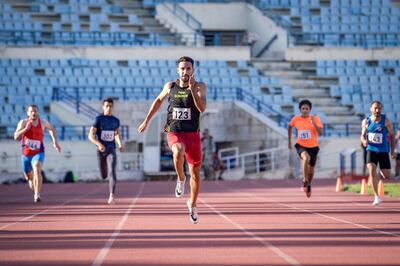
The family were forced to start again in their hometown of Nabatieh and were struggling to make ends meet.
Faced with the choice between supporting his family and pursuing his dreams, Nour forewent attending university to join the army. He did not abandon his dream entirely, however. Nour had heard that if he was good enough, he could be paid to compete in sports for the Lebanese Armed Forces. That was all the encouragement he needed.
“At first I thought, 'what did I do?' but there was no turning back, I could not do anything else. And I thought maybe later I could still be a footballer.”
For the first two years, Nour trained and performed his duties as any military man; carrying out orders, patrolling and directing traffic, but still holding onto his dreams of soccer stardom.
Keen to get noticed he signed up to an army athletics competition. Knowing nothing about track and field, he finished sixth in the 200m against runners who had been training for years. As a new recruit and the youngest on the track, it was enough to attract the attention of the head coach of Lebanese Army Athletics, Georges Asaaf.

“He told me that if I wanted to join I needed to totally commit to it, and train twice per day.” Nour remembers, “At that point, I knew I would do whatever it takes.”
Nour fully applied himself to the training, finding time between shifts and in the evenings to build his speed and endurance. He started to get results, in his first Lebanese national competition, representing the army, he finished third in the 200m.
As Hadid turned heads, he saw doors open up for him in athletics, and realised that it was time again for another sacrifice. After some words of wisdom from his coach he decided to park his dreams of being a footballer and focus solely on running.
This proved to be a wise decision; just one year later, in only his second year of competitive running in Lebanon, Hadid won both the 200m and 400m at the National Championships.
A clear cut above the rest, it was enough for Hadid to start representing his country. In February 2014, Nour was on a plane headed for Hangzhou, China to compete in the Asian Indoor Athletics Championships.
"My teammates were saying ‘It's OK, this is your first trip whatever you do, just try to run well, and don't worry about breaking any records,’” remembers Nour.
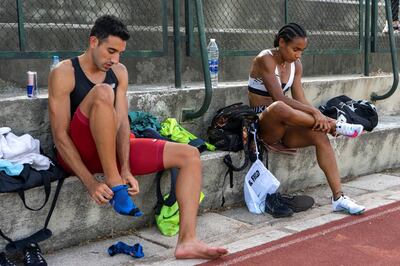
In his first race, however, Hadid broke the Lebanese National Record for the 400m indoor, stunning everyone including himself.
“I had no idea I could do it. My heart was beating so hard, it was a tough race especially against the Asian elite athletes.”
His record would remain unbeaten, as Nour shifted his focus to running outdoors. He intensified his training to increase his power and speed. He dropped the 400m all together to focus on the 100m and 200m.
“I just wanted to go faster,” Nour says.
When it comes to sprinting at an elite level, switching from 400m/200m to 200/100m can be incredibly tough. It didn’t phase Nour, who pushed himself further and harder to become a serious contender on the world stage.
Nour’s hard work started to pay off. In July 2016 at the track in Jamhour, he did what no-one else had been able to for 17 years, and broke the Lebanese national record for the 200m. The following year, also at Jamhour, he laid claim to the 100m record too.
Just six years after joining the army, he was relieved from most of his military duties. So long as he kept getting results, he would be supported by the army but could focus solely on progressing as a runner. He was invited to live and train with his coach, George Asaaf, at the Universite Antonine facility in Beirut, where Hadid lives today.
Nour is by far Lebanon’s most talented male sprinter, but unfortunately, his free gym pass and army salary make up the sum total of his financial and material support. Nour has no sponsors and his performances have not yielded the support that other elite national athletes would enjoy in other countries.
Nowhere was this clearer than at the 2019 Asian Athletics Championships in Doha. In the tournament, Hadid went further than any Lebanese had ever gone, progressing through the heats, the semi-finals and into the final, without any financial incentive or reward.
For his first ever shot at an international medal at a major competition, Hadid even had to borrow a speedsuit, which had originally been worn by Olympic Gold Medalist, Justin Gatlin.
Racing against elite athletes wearing bespoke speedsuits, many of whom would see healthy bonuses regardless of a podium finish, Nour was a surprising challenger. And yet, in his borrowed gear, Nour only just missed out on a bronze medal, finishing a gutting 0.01 seconds behind the third-place finisher.
“I was so mad. 0.01 seconds. I hate this 0.01,” says Nour, laughing.
As the other athletes revelled in the spoils of their successes, Nour returned home with his borrowed running suit, empty handed and to his home at the gym. He had been left with the sense that something has been taken from him, and it wasn’t just the medal.
As Hadid has traveled and competed internationally, it has been hard not to compare the resources and support that is afforded to his competitors. One can only wonder what Nour could be achieving had he the benefits of a manager, agent and sponsors along the way.
Hadid says it’s not just about the money, but the lack of resources in Lebanese athletics prevent competitive runners from reaching their full potential.
“[Other Arab] governments help their athletes with support and bring in professional coaches or athletes to compete against. Education could also be so much better here.”
“Sometimes I feel really disappointed. You feel like, ‘why am I doing this? I can't reach the elite level if I am still doing this.’ But I love the sport, I love doing this, doing what I am doing now.”
The financial collapse in Lebanon has made it even harder for Nour. Due to the severe devaluation of the lira, his army wages have dropped to below $150 per month. Unable to afford new gear, he warms up at the Jamhour track in training spikes that have holes in them.
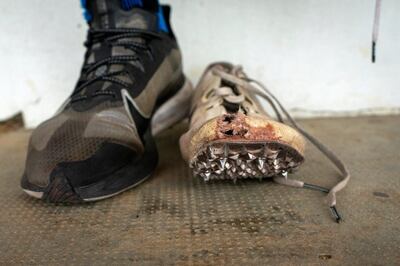
“You need to think all day about the financial situation. It's no joke. Many times you think you need to stop, you need to find a job. I worry about what I am going to do next.”
“What keeps me on the track is those competitions, you hope someday something is going to change.”
With the race easily won in Jamhour, Nour hops back into his modified Honda Civic to return yet again to his gym home. Further modifications to his car will have to wait, as the 17-inch rims collect scuffs and scratches from the pot-holled Lebanese roads.
He dreams now only of the Olympics, where if he is the one to be selected, he will be travelling with his borrowed speed-suit and worn out spikes.
On Sunday at The Erzurum Relay Cup in Turkey in -3m/s headwind, Nour shaved another 0.01 seconds off the 200m national record. In the same conditions he was just short of beating his own 100m record, again by 0.01 seconds. Both efforts only strengthen his case for selection for the Tokyo Games.
“I have been training all this time for this, even if just to represent Lebanon once in my life. This is my chance. It's an amazing feeling.”
